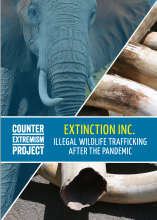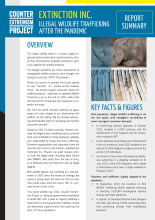Executive Summary

Three years ago, the COVID-19 pandemic swept across the globe upending life as we knew it.
One consequence of this extraordinary experience is a much greater collective awareness of the dangers posed to humanity by the threat of new diseases transmitted to humans from animals, i.e. zoonotic disease.
The fact that COVID-19 is widely believed to have originated in a Chinese wet market containing legal and illegal wildlife products has brought the dangers of the illegal wildlife trade (IWT) into much clearer focus, especially for policymakers.
In the last three years, China has taken a number of steps to ban or limit the import of wildlife products, culminating in the publication of its updated Wildlife Protection Law at the end of 2022, while both the United Nations (UN) and the European Union (EU) have introduced new measures to interdict the trade.
However, demand for illegally sourced wildlife products remains stubbornly high, and poachers and traffickers have proven adaptive to changing conditions during and after the pandemic - not least by moving much of their trade online.
Some of the largest ever recorded seizures have occurred in the last two years, with six tonnes of ivory discovered by Malaysian authorities in a shipping container on 10 July 2022, and 600 kilograms seized in Vietnamese ports over a single weekend in February 2023. In January 2021, Nigerian customs officials confiscated 9.5 tons of pangolin scales from one shipment.
As the pandemic increasingly cedes ground to other news stories, fears of zoonotic disease are losing their sharpness.
We cannot afford to slip back into complacency. Preventing the next pandemic is but one of the compelling reasons for action.
Along with habitat loss, pollution and, increasingly, climate change, illegal wildlife trafficking is driving an extinction rate estimated to be at least 1,000 times the historical average and the worst since the disappearance of the dinosaurs 65 million years ago.
This invidious trade, Extinction Inc., is increasingly monopolised not by small-time players but by major transnational crime syndicates, with extremist groups also playing an important role. They are reaping vast profits in the process. The illegal trade in animals and their body parts has grown to an estimated value of USD 23 billion a year while the illegal timber industry alone is valued at USD 150 billion per year.
The COVID-19 pandemic barely dented this booming illegal industry. Indeed, severe cuts to national parks’ budgets and skeleton staffing of ports, airports and border crossings provided a wealth of opportunities for increased poaching and smuggling. With wildlife consumer markets bouncing back and international passenger travel nearing pre-pandemic levels, seizures of illegally trafficked wildlife products are increasing again.

On world wildlife day 2023, we find ourselves at a crossroads.
Either we choose to capitalise on this precious opportunity to help prevent the next pandemic, tackle a global biodiversity crisis and deprive organised crime and extremist groups of a massive revenue stream, or we will very soon find that it is too late to turn back.
Part One of this report investigates the history of the global illegal wildlife trade, explaining how we have arrived at the present crisis and highlighting major emerging trends both in terms of trafficking and measures taken to tackle the trade.
Part Two explores the long history of wildlife exploitation for profit on the African continent, as seen through the lens of the ivory trade, while Part Three provides an overview of some most threatened species on the African continent besides the elephant, as well as the extremist groups which exploit them.
The Conclusion and Recommendations section sets out a detailed seven point plan for how to stamp out the illegal wildlife trade and avert the man-made extinction crisis in which we now find ourselves.